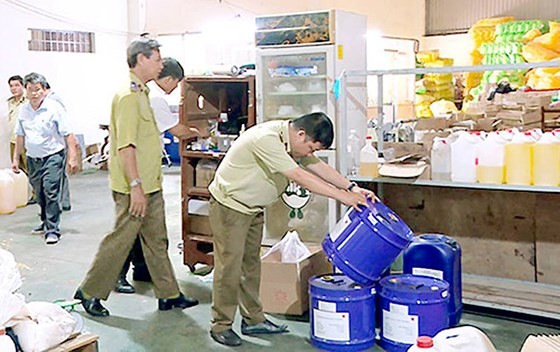
Online panacea
Some traditional medicines labeled as "Ethno medicine" for various illness including joint treatment, cough, diabetes, and even gynecology are advertised widely on Facebook, said the Dong Nai province Department of Market Management.
Without prescribing or consulting with doctors, consumers can click through to purchase and receive folk medicines at home with a guarantee of "a full refund if they do not work" offered by "online pharmacists".
However, not only is it hard to check the origin and use of these drugs but also they pose a lot of potential health risks. For example, some mothers have recently passed on the use of a cough medicine for kids which was widely advertised on Facebook. It was said to be an application for pain relief, swelling, cough, cold, healing, burns, insect bites, acne, and itchy rash. The online pharmacists also asserted that the drug was 100 percent natural, formulated by the Dao, and safe for all ages, including infants.
However, the medicine was detected falsely labeling its features and use which were originally in the form of emulsion, deodorant, and anti-odor to assist with massage and skin care.
It is hard to monitor the quality of the folk medicines heavily advertised online. These products represent both a cost to consumers' pockets and a risk to their health as they are often mixed with modern ingredients to bring immediate effects such as pain relief, acne clearing, firm and youthful skin maintaining, appetite increasing, and weight gain, according to the authorities.
"The use of traditional medicines actually takes a certain amount of time and does not work immediately. That some people trust in the misleading advertisement for drugs derived from nature and use for a long time causes a danger to their health", a traditional medical practitioner warned.
Uncontrollable fake cosmetics
During the first quarter of 2018, the authorities carried out over 630 inspections, detected 280 violations, fined, and remitted about VND 2.6 billion to the state's budget, the department reported.
In particular, counterfeits accounted for the highest rate with 114 cases, food safety 94 cases. The rest included smuggled goods and undocumented foreign goods with low quality.
Cosmetic counterfeits are the most common. The Feb.2 inspection of the HMH Trading & Services Co., Ltd (Tam Hiep Ward, Bien Hoa City) came upon more than 600 products without challan, most of them were cosmetics, such as toner, moisturizer, face cleanser, shampoo, conditioner, and lipstick.
Previously, the authorities also conducted a spot check on the branch of HV Cosmetics Company (Trang Dai Ward, Bien Hoa City) and found out thousands of undocumented cosmetics, including 18,000 bottles of body lotions, 224 bottles of body shower, 432 bottles of whitening cream, and 40kilogram of cream ingredient and other additives.
According to Mr. Huynh Kim Hoa, Head of Professional and Staff Division under Dong Nai Department of Market Management, the department directed the relevant teams to enhance market inspection and control as well as to propagate business households and individuals to strictly comply with the provisions of law to combat against smuggling, counterfeits, and commercial fraud.
However, the obstacles to access product information and establishments, and those trading online resulted in the limited number of cases detected and handled by authorities, Hoa concluded.
























